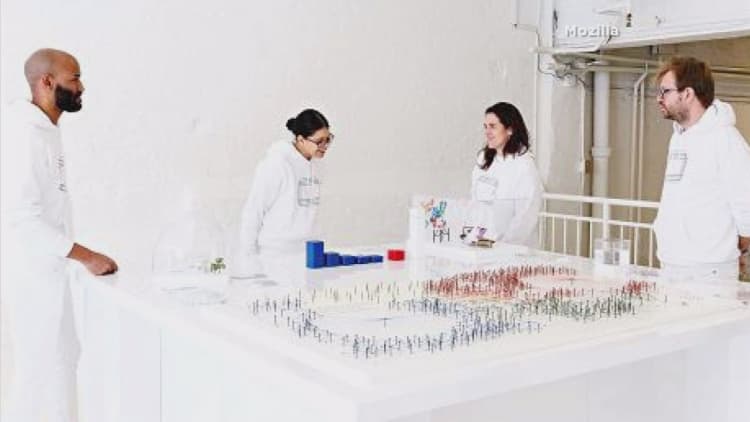
Most of us assume no one cares about what we look at on our devices, but the data is being used to create a picture of who we are and where we went — and, for the most part, it's completely legal.
"Privacy is a fundamental right … but the truth of the matter is, it's really about the agreement between the user and the websites they are going to," said Denelle Dixon-Thayer, chief legal and business officer at Mozilla.
One could argue the positives and negatives, but Dixon-Thayer said no matter what, people should be aware of what data they are sharing. However, most people don't read the fine print when they linked their Gmail account to their Google searches, agree to terms and conditions on Apple's iTunes or create an account on Facebook.
"We believe in this 'no surprises' rule, that your user is not going to be surprised by what data you collect and what you do with that data," she said. "Companies should focus on alerting users to issues that may surprise them, so users have the opportunity to understand it. It makes it so we are creating an ecosystem of trust."
To show how your data can be used to reveal personal and intimate details about your life, Mozilla and Tactical Technology Collective created "The Glass Room" in New York. Part art installation, part practical technology display, the exhibition — which is open through Dec. 18 — shows conceptual and real-life ways online information can be used to track people. The company hopes it will inspire people to think more about how their data is being used.
For example, anyone who walks by "The Glass Room" and has their Wi-Fi turned on has their phone and carrier broadcast on a screen inside the room. (The group could have parsed more information from people but wanted to make sure everything was within legal grounds.) The exhibit also features ways for people to visualize or manipulate data. One area has encyclopedias of leaked LinkedIn passwords. One installation, called the Unfitbit, shows how easy it is to trick a Fitbit into adding steps by hooking it onto a drill, on the tire of a taxi or a metronome.
The "Big Mama" section shows real apps and devices companies have made to use data. Parabon Snapshot uses DNA to create digital images of a person by using the genetic data to determine ancestry, appearance and relationships. Churchix uses facial recognition software to determine who is going to church. Johnson & Johnson can create a real-time map of who is sick out of self-reported data through the app Sickweather, which lets users send a notification when someone near them is ill. Humanyze is an employee badge that collects data on whether you scanned into work as well as where you are in the office to help determine your optimal production capabilities. If you're not at your desk, it knows.
Dixon-Thayer said people should be aware of the data they share. She pointed out there are tools out there like the private browsing mode on its Firefox browser or ad blocking technologies to limit tracking. "The Glass Room" also offers free workshops and an "Ingenious" bar — a play on Apple's Genius bar — to help people limit how much data they reveal.
However, opponents to ad blocking argue that advertising is the main way that digital publications make money. Limiting them cuts revenue, which forces media companies to cut their coverage or shut down. An Adobe/PageFair report this year said about 16 percent of the world's smartphone users have ad blocking software on their phones. The companies estimated ad blocking cost publishers almost $22 billion in 2015.
Dixon-Thayer said she understands the economic model, but believes that if advertising is innovative and engaging people won't want to block it. And to do that, you don't need to derive as much data about users without their knowledge, she said.
"One of the things we are really good at is engaging users and wanting them to be part of the product they are delivering," she said. "One of the things we forget about is privacy is an important part of that product."


